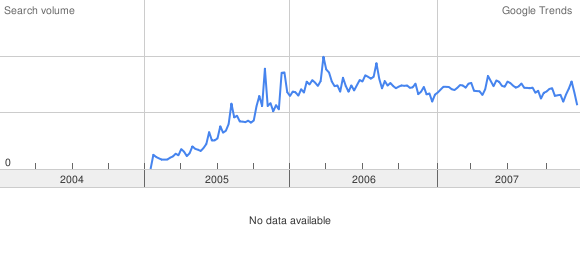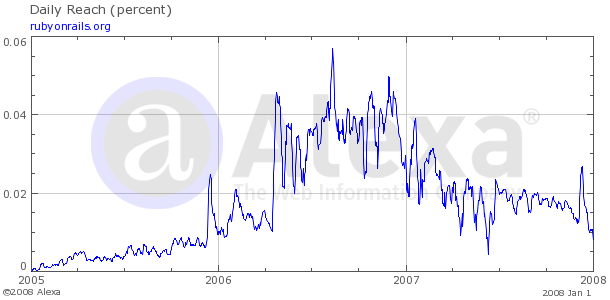Tim Bray fearlessly predicts the future:
Rails will continue to grow at a dizzying speed, and Ruby will in consequence inevitably become one of the top two or three strategic choices for software developers. But at the same time, other frameworks and tool-sets are learning its lessons, so Rails will get some serious competition.
Now you may remember that I made my own prediction about Rails:
...the important point is that Rails peaked somewhere in the middle of 2006 and is now declining.
While I disagree with Tim on the future of Rails, I do agree with him on other frameworks learning the lessons of Rails:
All of that should not diminish Rails, but instead should put it in proper perspective. The real value in Rails was a singular, opinionated vision of how web development should be done. That vision moved the bar for the whole industry, which is quite an accomplishment. But there's nothing magical about Ruby, or Rails. All of the underlying concepts of Rails can be 'ported' to almost any other language, which is exactly what were seeing today, with Rails-like frameworks appearing in Python, Perl, etc. Rails success was defining the platonic solid for second generation web frameworks. Framework 2.0.
The differences between our predictions are that I said Rails would decline and not continue to grow at a dizzying speed - I made my prediction 14 months ago, and finally - my prediction is right. Here is a Google Trends chart for "ruby on rails", in which you clearly see that Rails peaked in the middle of last year.
Tim seems to be suffering from confirmation bias, what with all the Ruby and Rails conferences he's attending, and the company he's working for which is working very hard to find a future life for the JVM. I personally have my doubts about how fit the JVM is for anything but Java. For example, here is a quote off the Factor front page:
Factor began as a scripting language in a Java game project and quickly grew into a general-purpose language. While this was happening, the limitations of the Java virtual machine were making themselves apparent, and an effort to write a native Factor implementation with a minimal core in C was kicked off. The native implementation was bootstrapped from Java Factor, and soon thereafter native Factor became the de facto implementation, work on the Java implementation stopped.
A good check against confirmation bias is to pick an unbiased measure for your prediction ahead of time. I didn't choose Alexa ahead of time for my measure since its numbers can be questionable and open to gaming, but it appears in this case to confirm the Google Trends data.
So what have we learned? Tim's prediction is already wrong, unless there's some new and unusual definition of "grow at a dizzying speed" that means "shrink". We've learned to take any prognosticating that comes without a pre-selected unbiased metric of success with a huge grain of salt. Finally, we've learned that even the O'Reilly hype machine has its limits and can no longer keep the Rails ball in the air. Maybe next year they'll rewrite "RESTful Web Services" with all the examples in Scala.
Update: Michael Foord in the comments points out a similar flat-lining of Ruby in the TIOBE index. That would be three independent sets of data (Google Trends, Alexa, and TIOBE) that show at the very least that neither Ruby nor Rails are growing at a "dizzying speed". Note carefully that we aren't talking about predictions anymore. We're talking about Tim's statement that Ruby and Rails grew at a dizzying speed this year; the thing you have to believe is true before you can even get to the prediction.
Posted by Teltariat on 2008-01-04
Posted by chromatic on 2008-01-04
This search shows over 164 articles on the Radar site that mention Rails. So yes, I'd say hype.
Posted by Joe on 2008-01-04
Posted by Joao Pedrosa on 2008-01-04
Posted by Michael Makunas on 2008-01-04
Posted by crayz on 2008-01-04
- 'site:http://radar.oreilly.com/ rails inurl:2005' : 40
- 'site:http://radar.oreilly.com/ rails inurl:2006' : 59
- 'site:http://radar.oreilly.com/ rails inurl:2007' : 57
- 'site:http://radar.oreilly.com/ java inurl:2005' : 45
- 'site:http://radar.oreilly.com/ java inurl:2006' : 67
- 'site:http://radar.oreilly.com/ java inurl:2007' : 84
Posted by Keith Fahlgren on 2008-01-04
Maybe if you compare similar things, you'll see what I'm talking about.
Trends for Django, Ruby on Rails, Grails and the Zend Framework. Rails is the only one with a negative slope.
Posted by Joe on 2008-01-04
Posted by Keith Veleba on 2008-01-04
Thanks for inadvertently making my point for me.
Yes, in 2005, when very few people knew about Ruby or Rails the Radar site pumped out 40 posts on Rails and a total of 51 posts that mention either Ruby or Rails. That's one post a week. That's hype.
Posted by Joe on 2008-01-04
Michael Foord
Posted by Michael Foord on 2008-01-04
Posted by Mike Champion on 2008-01-04
Posted by Petar on 2008-01-04
Posted by Bill de hOra on 2008-01-04
More likely the Trends data show that the number of people who heard about Rails, didn't know what it was, and Googled those terms has peaked.
Right, silly old me measuring the growth of Rails by 'newcomers'.
Posted by Joe on 2008-01-04
That link to the O'Reilly book market summary is interesting. I noticed you didn't point to the most recent one, which seems to show Ruby book sales growth the same as Python sales growth (the little squares are the same color), and sitting at about half the volume (the Ruby square is half the size). The other thing is that between January and May the focus of the analysis was switched from Ruby books to Rails books. It will interesting to see where these numbers are if/when the next state of the computer book market report is done.
Posted by Joe on 2008-01-04
Posted by Ignacio on 2008-01-05
Posted by chromatic on 2008-01-05
Could we be any more explicit about our appreciation for and expectations of Ruby on Rails? Aside from writing about it left, right, and center; including it in our publishing plans; and packing more Rails goodness into our Open Source Convention than you can shake a stick at, that is. (Not to mention Rails hacking in any spare waking moments.)
We've also just put our money where our radar is by supporting Rails Day 2005, a 24 hour Ruby on Rails hackathon put together by Lucas Carlson and friends.
Posted by Joe on 2008-01-05
Posted by chromatic on 2008-01-05
From the Radar's about page:
At O'Reilly, a big part of our business is paying attention to what's new and interesting in the world of technology. We have a pretty good record at having anticipated some of the big technology developments in recent history.
I think what has been bugging me most is that in the case of Ruby and Rails it seems like O'Reilly crossed the line from 'anticipating' to 'asserting'. As if the rise of Ruby and Rails was predicted and then everything possible was done to make sure that prediction came true.
Posted by Joe on 2008-01-06
Joe,
I can understand that perspective, especially given the book Beyond Java. I thought we did have way too many Rails books planned in Q3 2005, for example (but fortunately we didn't publish all of them).
I've never quite understood what people meant when they said that O'Reilly really pushed Rails as a conspiracy to sell books, especially given that from January 2005 (when we published Curt Hibbs's first big tutorial article) to mid-2006, we published a handful of articles (four or five I believe), Beyond Java, and a few weblogs. To make that conspiracy theory fit the facts of what happened, we'd have to be great at pushing things and lousy at making money off of it.
If we did have an identifiable cheerleading period, I believe it ended in 2006.
I think what you're seeing may be more a reflection of where buzz is among the so-called alpha geeks with weblogs. I'd certainly like to see a lot less technofetishism and taillight chasing there, but to some degree all conversations are circular, so it's not entirely avoidable.
Posted by chromatic on 2008-01-06
Posted by crayz on 2008-01-07
 Joe Gregorio
Joe Gregorio


Posted by Patrick Mueller on 2008-01-04